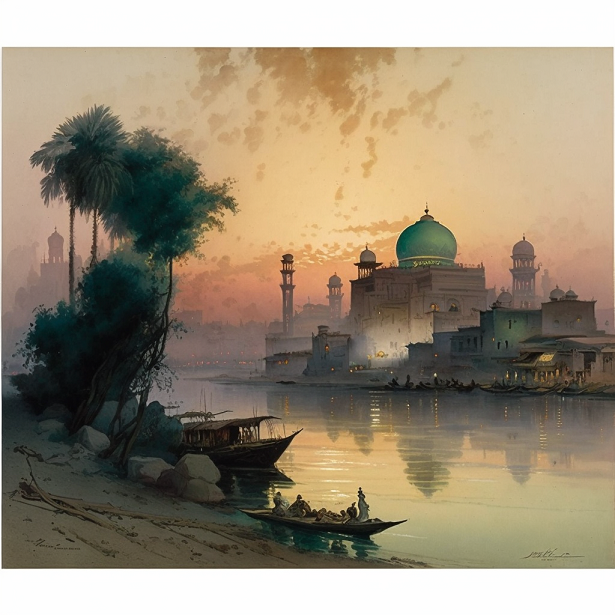Freya Stark’s “Baghdad Sketches” stands as a testament to her multifaceted talents as an explorer, travel writer, and artist. Although primarily celebrated for her iconic travel narratives, Stark’s critical acumen extended beyond her own adventures. Beyond her exploratory journeys, she proved her prowess as a literary connoisseur by contributing to academic journals, critiquing the travel writings of her contemporaries.
“Baghdad Sketches” is a collection of travel impressions within Iraq, adorned with the exquisite line drawings of street and river scenes, as well as depictions of characteristic figures. Stark’s unique blend of vivid narration and keen observation offers readers an engaging perspective on the diverse landscapes and cultures she encountered during her time in Iraq. It is within these pages that we explore the vibrant tapestry of Iraq through her exploration of its landscapes, interactions with its people, and striking artistic illustrations, all of which are captured in the captivating pages of “Baghdad Sketches.”
As we delve into the dimensions of this remarkable book, we will journey through Stark’s experiences in Iraq, seeking to understand her keen observations and the cultural immersion that defined her travels. We will delve into her interactions with Iraqi society, her artistic collaboration with illustrator E. N. Prescott, and the enduring value of “Baghdad Sketches” in providing insights into Iraq’s past and present. In exploring this multifaceted work, we uncover the legacy of Freya Stark as both an intrepid voyager and a discerning literary critic.
Exploring Iraq through Stark’s Eyes
Stark sets the stage by portraying Iraq as a land of captivating contrasts. The book encompasses both her travel impressions and the enchanting line drawings created by E. N. Prescott. With these visuals and words, readers are transported to Iraq and can visualise its unique characteristics. Stark’s depiction of Iraq is far from a standard guidebook; her narratives breathe life into the landscapes and cultures.
A Fresh and Engaging Perspective
In ‘Baghdad Sketches,’ Stark offers a refreshing perspective on Iraq. Her observations are characterised by shrewdness and sympathy, creating a unique viewpoint that goes beyond the superficial. Her interaction with Iraq’s landscapes and people is characterised by empathy, making her account of the region all the more engaging.
Personal Encounters and Cultural Immersion
Stark shares anecdotes from her explorations in Iraq, which demonstrate her keen interest in understanding the local culture and building relationships with Iraqi society. Readers will be captivated by the stories of her quest for a rental house in Baghdad, her life in a tiny slum dwelling near a mosque, and her experiences with local families, such as the Syriac Christians who invited her to share their family ceremonies. These encounters showcase her ability to delve into the heart of Iraq and its people.
A Glimpse into the Iraqi Way of Life
Stark’s writings convey the daily lives of Iraq’s residents, helping readers appreciate the cultural nuances and lifestyles. Through vivid descriptions and narratives, she portrays the changing scenes of the Tigris River, life on its banks, and the bustling streets of Iraqi cities. Her account of a lodging on the western bank of the Tigris offers a clear picture of the local atmosphere, down to the water’s “lion-coloured” appearance.
Wider Connections and Intimate Experiences
While Stark’s primary focus is Iraq, she offers a broader perspective by embarking on journeys to other places, such as Kuwait, the Yezidis’ temple at Sheikh ‘Adi, and encounters with the welcoming Sheikh Ajil of the Shammar. These episodes illustrate her curiosity, her ability to bridge cultures, and her openness to diverse experiences.
The Courtesy of Sheikh Ajil Al-Shammari
One of the highlights of Stark’s journey was the warm hospitality extended by Sheikh Ajil of the Shammar, one of the most courteous hosts she encountered. Her description of her stay in his guest tent exemplifies the graciousness and hospitality deeply rooted in Iraqi culture. Stark’s encounter with Sheikh Ajil serves as a testament to the enduring tradition of welcoming strangers with open arms.
In this section, we witness Stark’s engaging narrative style, combining personal encounters, rich descriptions, and her affinity for cultural immersion. As she unveils her explorations in Iraq, readers are transported to the heart of the region, experiencing its beauty, diversity, and profound cultural interactions through her eyes.
A Land of Beauty and Struggle
In this section of Freya Stark’s review of “Baghdad Sketches,” we delve deeper into the charm and challenges that define Iraq as she witnessed during her travels. Stark masterfully encapsulates the allure of the country’s ancient beauty juxtaposed with the difficulties faced by its people.
A Captivating Blend of Antiquity and Squalor
Stark portrays Iraq as a place where antiquity and beauty coexist with squalor. She skilfully paints a picture of the country’s landscapes and architecture steeped in history. Her vivid descriptions transport readers to the streets, markets, and riverbanks, allowing them to visualise the unique blend of the old and the new that defines Iraq.
The Splendour of Iraq’s Springtime
Stark vividly describes the fleeting beauty of Iraq during springtime. The wildflowers that bloom during this short season capture the essence of the country’s natural beauty. Her portrayal resonates with the idea that beauty can be found even in the most unexpected places, revealing the profound connection between Iraq’s landscapes and its people.
Unveiling the Struggles of Iraqi Towns
Amid the charm and allure, Stark also uncovers the harsh realities faced by Iraqi towns. She draws attention to Mandali, a town on the Iranian border once known for its lush gardens and date palms. Now, it is withering away due to changes in water supply, leaving its trees to perish and its harvests to dwindle. Stark’s narrative offers a poignant commentary on the challenges confronting the people of Iraq, despite the region’s beauty and cultural riches.
Stark’s ability to capture Iraq’s duality, its beauty and struggles, underscores her talent as an astute observer and storyteller. Through her descriptive narratives and perceptive insights, she provides readers with a comprehensive understanding of Iraq as it was during her explorations. Her evocative storytelling allows readers to experience the enchanting beauty and profound challenges of the region through her eyes.
Experiencing Iraqi Festivities
Stark immerses herself in Iraq’s cultural celebrations, providing readers with a first-hand experience of the festivities. Her account of “A Syriac Christmas” with her Syriac Christian landlord and his family offers an intimate view of Iraqi traditions and customs. Stark’s narrative conveys the warmth and inclusivity of the Iraqi people during moments of celebration.
Stark’s portrayal of Iraqi people and cultures is a testament to her ability to connect with and understand the diverse communities she encountered. Her writings celebrate the multiculturalism of Iraq, offering readers a lens through which to appreciate the complex mosaic of societies and traditions that define the region. Through Stark’s vivid storytelling, Iraq comes to life as a land where people from different backgrounds coexist and contribute to the rich cultural fabric of the country.
Stark’s ability to embrace and appreciate the cultural diversity of Iraq is evident in her interactions with its people. Her willingness to partake in local customs and ceremonies, coupled with her insightful pilgrimages, reflects her deep respect for the region’s rich cultural tapestry. The graciousness of individuals like Sheikh Ajil showcases the enduring tradition of hospitality that has left a lasting impression on Stark. Through her accounts of these cultural encounters, readers gain a deeper understanding of the human connections that transcended language and borders during her journey through Iraq.
Freya Stark’s narrative takes readers on a profound journey, unveiling the intricate layers of Iraq’s character. From its enduring antiquity and beauty to its struggles with squalor, laissez-faire attitude, and racial pride, Stark’s reflection underscores the complex nature of the nation. Her account of Mandali serves as a poignant reminder of the cost of progress. Ultimately, Stark’s work allows us to appreciate Iraq’s timeless struggles and the resilience of its people, painting a vivid portrait of a nation marked by its rich history and enduring spirit.

